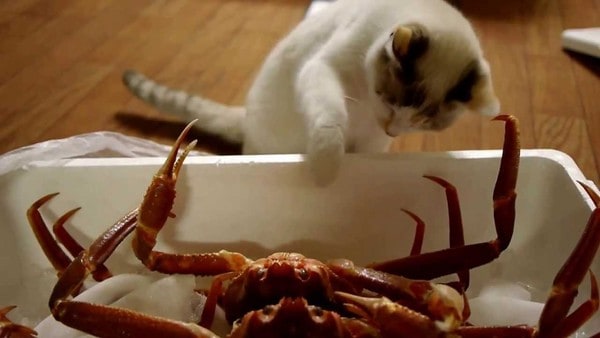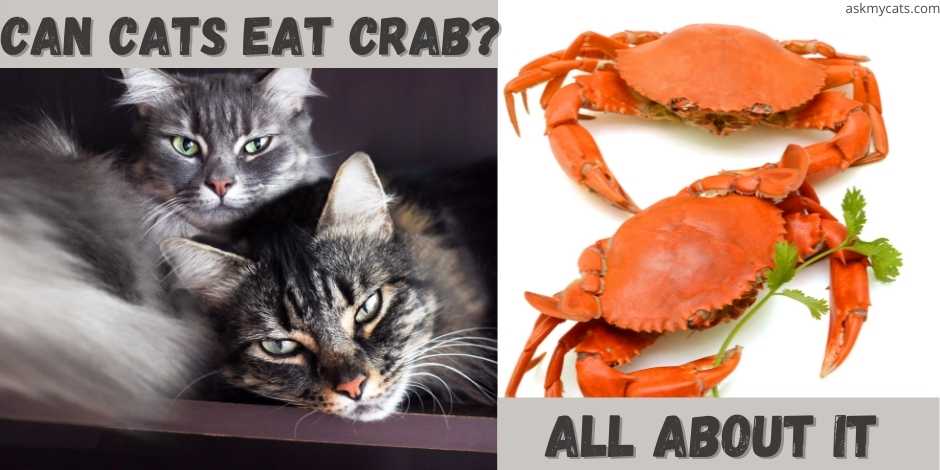Cats are known for their curious nature and their tendency to explore new tastes and flavors. As a cat owner, you may have wondered whether it is safe to feed your feline friend crab. In this article, we will delve into the topic of whether cats can eat crab and explore the potential benefits and risks associated with this seafood delicacy.

Can Cats Safely Consume Crab?
While cats are obligate carnivores and primarily require a diet rich in animal protein, it is important to consider the specific food items that are safe for them to consume. When it comes to crab, the answer is both yes and no. While small amounts of cooked crab meat can be safe for cats, there are certain precautions that need to be taken into account.
The Benefits of Feeding Cats Crab
Crab meat is a good source of protein, which is essential for a cat’s overall health and wellbeing. It contains essential amino acids that help in muscle development and repair. Additionally, crab meat is rich in vitamins and minerals such as vitamin B12, zinc, and selenium, which contribute to a cat’s immune system and promote healthy skin and coat.
Potential Risks of Feeding Cats Crab
Despite the potential benefits, there are also risks associated with feeding cats crab. One of the main concerns is the presence of shells and bones, which can pose a choking hazard or cause gastrointestinal blockages. It is crucial to ensure that the crab meat is thoroughly cleaned and free from any shells or bones before offering it to your cat.
Another risk to consider is the seasoning or spices often used when preparing crab dishes. Cats have a sensitive digestive system, and certain seasonings like garlic, onion, or excessive salt can be toxic to them. It is important to serve plain, unseasoned crab meat to your cat to avoid any potential health issues.
How to Safely Introduce Crab to Your Cat’s Diet
If you decide to introduce crab to your cat’s diet, it is essential to do so gradually and in moderation. Start by offering a small amount of cooked, plain crab meat and observe your cat’s reaction. Look for any signs of digestive upset or allergic reactions such as vomiting, diarrhea, or excessive itching. If your cat shows any adverse symptoms, discontinue feeding crab immediately and consult your veterinarian.
Conclusion
In conclusion, while cats can eat crab in small amounts, it is crucial to take certain precautions to ensure their safety. Always remove any shells or bones and serve plain, unseasoned crab meat. Monitor your cat’s reaction and consult your veterinarian if you have any concerns. Remember, a balanced and species-appropriate diet is key to keeping your feline friend healthy and happy.
FAQs
-
Is it safe to feed my cat raw crab?
No, it is not recommended to feed your cat raw crab. Raw seafood can contain harmful bacteria and parasites that can cause food poisoning or other health issues in cats. It is best to cook the crab thoroughly before offering it to your cat. -
Can cats eat crab shells?
No, cats should not consume crab shells. Crab shells can pose a choking hazard and may cause gastrointestinal blockages. Always ensure that the crab meat is free from any shells before feeding it to your cat. -
Are there any alternatives to feeding my cat crab?
Yes, there are several alternatives to crab that you can include in your cat’s diet. Some safe options include cooked chicken, turkey, or fish specifically formulated for cats. It is important to consult your veterinarian for specific dietary recommendations for your cat. -
Can cats be allergic to crab?
Yes, cats can develop allergies to crab, just like humans. If you notice any signs of allergic reactions such as itching, swelling, or difficulty breathing after feeding your cat crab, discontinue the food immediately and consult your veterinarian. -
Can I give my cat crab as a treat?
While small amounts of cooked crab meat can be given as an occasional treat, it should not replace a balanced and complete cat diet. Treats should only make up a small portion of your cat’s overall calorie intake to maintain their nutritional needs.

